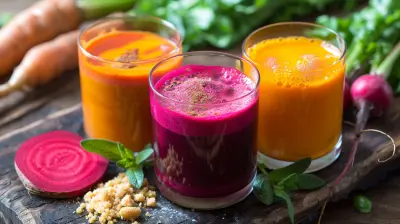Immune System Myths Debunked: Separating Fact from Fiction
25 September 2025
The immune system is a fascinating and complex defense mechanism that keeps us safe from harmful invaders like bacteria, viruses, and other pathogens. But with so much information floating around, it's easy to get caught up in myths and misinformation.
Some believe that loading up on vitamin C can prevent colds, while others swear by detox diets to "reset" their immunity. But how much of this is true, and how much is just clever marketing?
Let's break down some of the most common immune system myths and set the record straight.

Myth #1: Taking Mega Doses of Vitamin C Prevents Colds
We've all heard it—drink orange juice or take vitamin C supplements to fend off the sniffles. But is there any truth to this claim?The Reality: Vitamin C Isn't a Magic Bullet
While vitamin C does play a role in immune function, taking massive doses won’t necessarily prevent you from catching a cold. Studies show that for most people, loading up on vitamin C won't stop colds from occurring. However, it may slightly reduce the severity and duration of symptoms.So, does this mean you should ditch vitamin C altogether? Not at all! A balanced diet with vitamin C-rich foods like citrus fruits, bell peppers, and strawberries can help support overall health, but don’t expect it to act as a force field against colds.

Myth #2: Cold Weather Makes You Sick
Your grandma may have warned you to bundle up or risk catching a cold, but does cold weather really make you sick?The Reality: It's the Indoor Crowds, Not the Cold
The temperature itself doesn’t cause illness. Instead, colder weather forces people indoors, where they’re in close proximity to others, increasing the chances of virus transmission.Viruses, like the common cold and flu, spread more easily in enclosed spaces with poor ventilation. So while shivering outside won't directly make you sick, being in crowded, stuffy rooms might. Washing hands frequently and avoiding close contact with sick individuals is a better strategy than just wearing a heavy coat.

Myth #3: You Can "Boost" Your Immune System Instantly
Everywhere you look, there are products claiming to "supercharge" or "boost" your immune system. But can you really hack your immune system into overdrive with a pill or drink?The Reality: A Balanced Immune System Is Key
The idea of boosting immunity sounds great, but it's a bit misleading. Your immune system isn’t like a muscle that you can strengthen with a workout. Instead, it functions best when it’s well-regulated.An overactive immune system can be just as problematic as a weak one—it can lead to autoimmune diseases, where the body mistakenly attacks its own cells. The best way to support immunity is through healthy habits: eating nutritious foods, staying active, getting enough sleep, and managing stress. There’s no miracle shortcut.

Myth #4: Antibiotics Help Fight Viral Infections
You wake up with a terrible sore throat and a fever. Should you grab some antibiotics to speed up recovery?The Reality: Antibiotics Only Work Against Bacteria
Antibiotics are powerful, but they only target bacterial infections—not viruses. Colds, the flu, and COVID-19 are all viral infections, meaning antibiotics won’t do anything to help.Misusing antibiotics can lead to antibiotic resistance, which is a serious public health threat. Instead of demanding antibiotics for viral illnesses, focus on symptom relief, rest, and hydration. If symptoms persist or worsen, seeing a doctor is always a good idea.
Myth #5: Detox Diets Cleanse and "Reset" Your Immune System
There’s a lot of buzz around detox cleanses that supposedly flush toxins out of the body and reset immunity. But does the body really need detoxing?The Reality: Your Body Detoxes Itself
Your liver and kidneys are already doing a fantastic job of eliminating toxins. The idea that a green juice diet or special herbal tea can "cleanse" your immune system is more marketing than science.Instead of restrictive detox diets, focus on whole foods, fiber, and hydration to support your body's natural detoxification processes. A well-balanced diet with vitamins, minerals, and antioxidants is a more effective way to keep your immune system functioning optimally.
Myth #6: More Exercise Means a Stronger Immune System
Exercise is great for overall health, but is there such a thing as too much of a good thing?The Reality: Overtraining Can Weaken Immunity
Moderate exercise is beneficial for the immune system, but overdoing it can actually weaken it. Intense, prolonged exercise—especially without adequate rest—can suppress immune function, making you more susceptible to infections.Think of your immune system like a battery; regular movement helps keep it charged, but pushing too hard can drain it. Rest days and proper recovery are just as important as the workouts themselves.
Myth #7: Stress Doesn’t Affect Immunity
You might think stress only impacts your mood, but it actually plays a huge role in immune health.The Reality: Chronic Stress Weakens the Immune System
When you're constantly stressed, your body releases cortisol, a hormone that, in high doses, can suppress immune function. Chronic stress makes it harder for your body to fight off infections.Managing stress through mindfulness, exercise, social connections, and relaxation techniques can help keep your immune system in top shape. Your mind and body are more connected than you might think!
Myth #8: Hand Sanitizer is Better Than Soap and Water
Sure, hand sanitizer is convenient, but is it the best way to keep germs at bay?The Reality: Soap and Water Are More Effective
Hand sanitizer is great in a pinch, but it doesn’t eliminate all germs. It works well against many viruses and bacteria, but soap and water are more effective at removing dirt, grease, and certain pathogens.Whenever possible, washing hands with soap and water for at least 20 seconds is the best way to stay germ-free. If soap isn’t available, then a sanitizer with at least 60% alcohol is a good backup.
Myth #9: Getting Sick Helps "Train" Your Immune System
Some people believe that catching frequent colds or infections helps "train" their immune system to be stronger. But does this theory hold up?The Reality: Frequent Illness Can Weaken Immunity
While exposure to pathogens helps build immunity, constantly getting sick is not a sign of a well-functioning immune system. Repeated infections can wear the body down, leading to longer recovery times and increased vulnerability to future illnesses.Vaccines are a much safer way to build immunity against serious diseases without the risks of repeated infections.
Myth #10: Natural Remedies Can Cure All Infections
Herbal teas, essential oils, and other natural remedies are often praised for their immune-boosting properties. But can they replace modern medicine?The Reality: Natural Remedies Have Limits
While some natural remedies can support overall health, they aren’t a cure-all. For example, honey can soothe a sore throat, and ginger may help with nausea, but they won’t fight off serious infections.When dealing with bacterial infections, chronic conditions, or severe viruses, medical intervention is necessary. Natural approaches can complement conventional medicine, but they shouldn’t replace proven treatments.
The Bottom Line: Science Over Myths
There’s a lot of misinformation about the immune system, and it’s easy to fall for quick-fix solutions. The best way to support your immunity isn’t through gimmicks but through simple, science-backed habits:- Eating a balanced diet
- Getting enough sleep
- Managing stress
- Exercising in moderation
- Practicing good hygiene
No magic pill or special diet will replace these fundamentals. When it comes to immunity, consistency is key!
all images in this post were generated using AI tools
Category:
Immune SystemAuthor:

Laurie Barlow
Discussion
rate this article
1 comments
Solaria Cummings
Reading this article was like clearing out my fridge—goodbye, expired myths! Who knew my immune system wouldn’t be stronger from eating kale chips at midnight? Now I can focus on sneezing in peace, knowing the truth. Thanks for the clarity!
October 10, 2025 at 4:36 AM

Laurie Barlow
Thank you for your insightful comment! I'm glad the article helped clear up those myths. Here's to a healthier understanding of our immune systems!


